Argumentative Essay on Homesickness & Language Acquisition
VerifiedAdded on 2022/08/21
|5
|1859
|15
Essay
AI Summary
This argumentative essay examines the multifaceted impact of homesickness on language acquisition among international students in post-secondary education. The essay delves into the academic challenges faced by these students, particularly language deficiencies that hinder their ability to understand lectures, participate in discussions, and develop oral skills. It highlights the importance of language acquisition planning, the role of learner autonomy, and the influence of cultural and political factors. The essay also presents counterpoints regarding the role of language barriers and the need for inclusivity. The conclusion emphasizes the diverse experiences of international students and the various strategies for overcoming language barriers. The essay includes article summaries and references, providing a comprehensive overview of the issue.
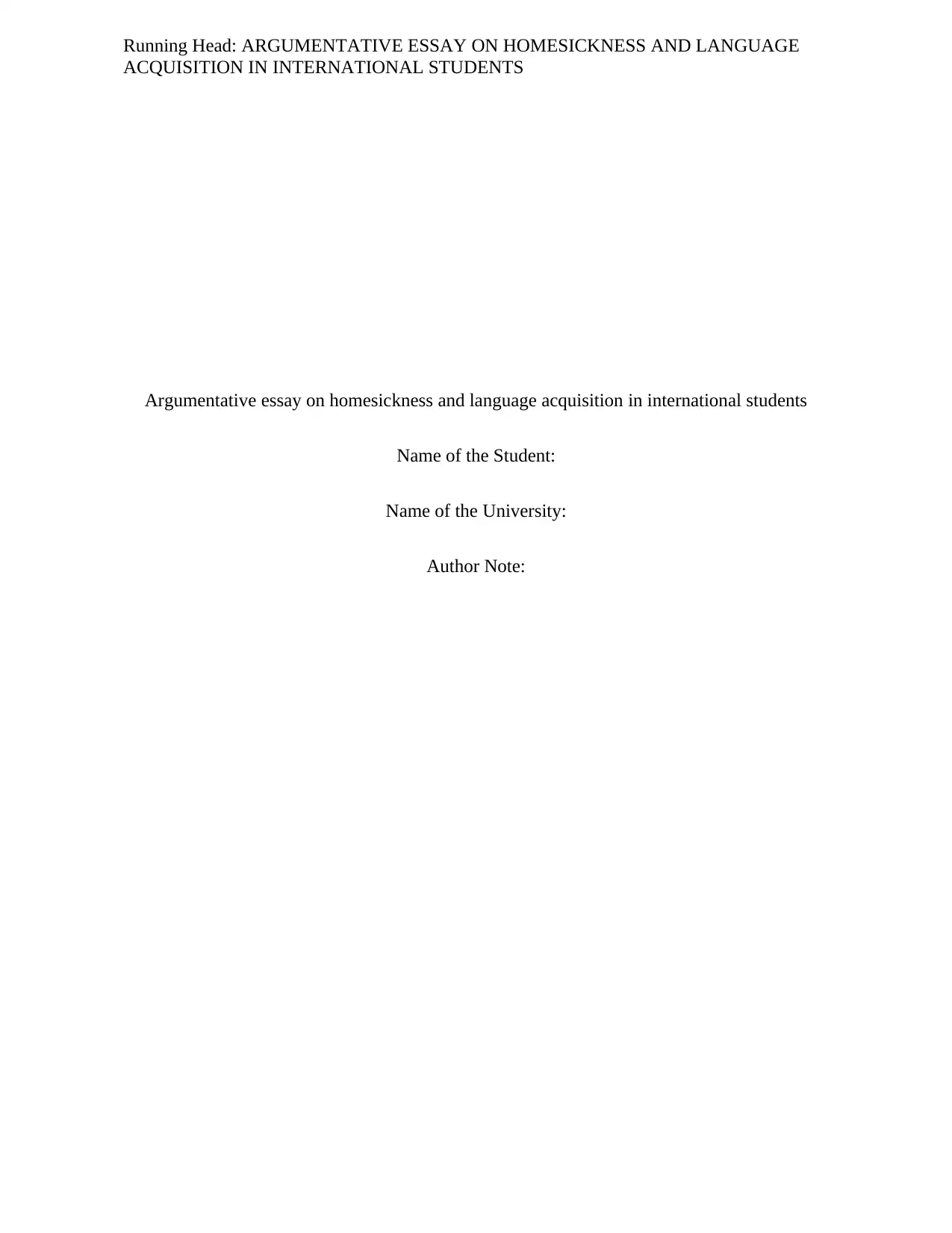
Running Head: ARGUMENTATIVE ESSAY ON HOMESICKNESS AND LANGUAGE
ACQUISITION IN INTERNATIONAL STUDENTS
Argumentative essay on homesickness and language acquisition in international students
Name of the Student:
Name of the University:
Author Note:
ACQUISITION IN INTERNATIONAL STUDENTS
Argumentative essay on homesickness and language acquisition in international students
Name of the Student:
Name of the University:
Author Note:
Paraphrase This Document
Need a fresh take? Get an instant paraphrase of this document with our AI Paraphraser
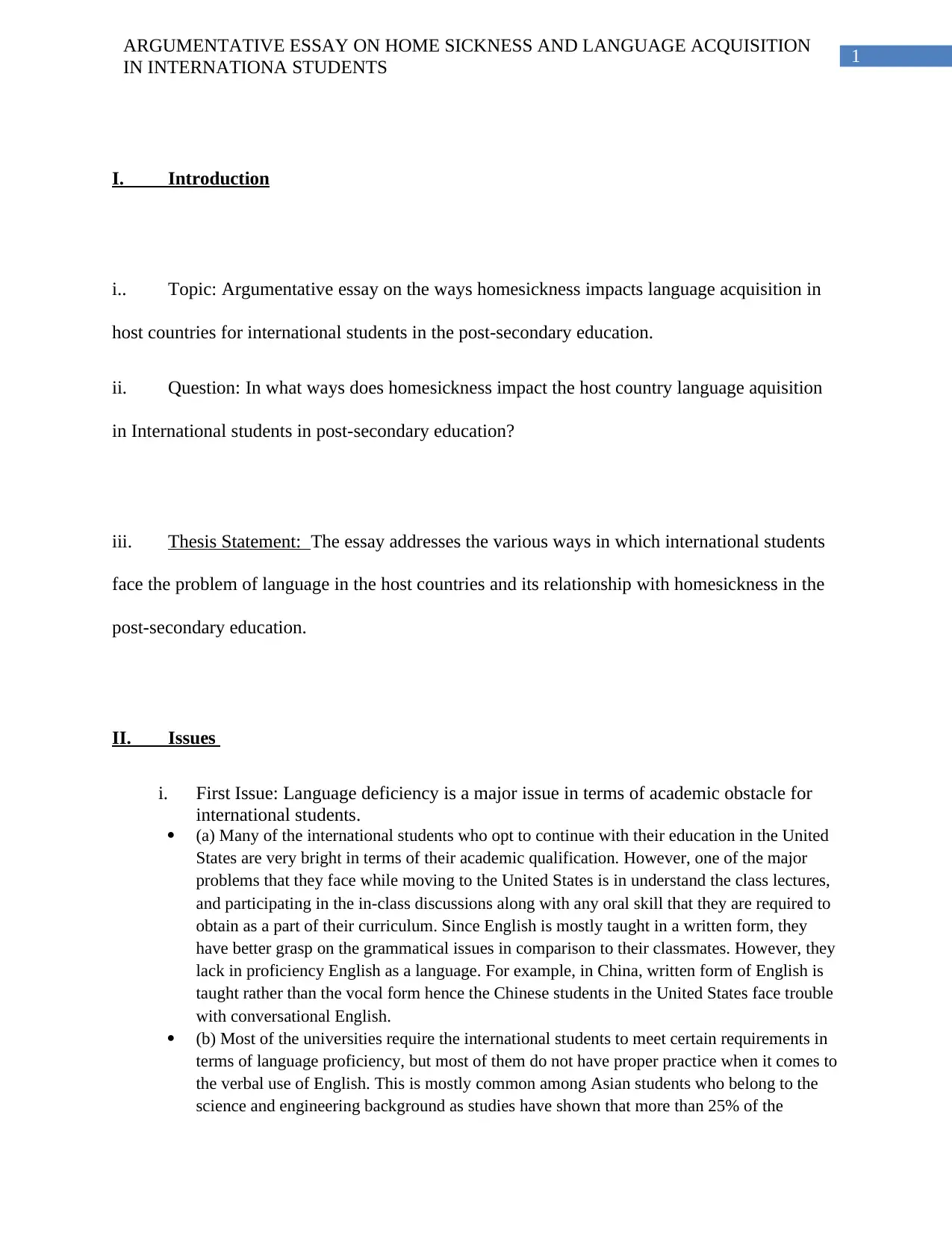
1
ARGUMENTATIVE ESSAY ON HOME SICKNESS AND LANGUAGE ACQUISITION
IN INTERNATIONA STUDENTS
I. Introduction
i.. Topic: Argumentative essay on the ways homesickness impacts language acquisition in
host countries for international students in the post-secondary education.
ii. Question: In what ways does homesickness impact the host country language aquisition
in International students in post-secondary education?
iii. Thesis Statement: The essay addresses the various ways in which international students
face the problem of language in the host countries and its relationship with homesickness in the
post-secondary education.
II. Issues
i. First Issue: Language deficiency is a major issue in terms of academic obstacle for
international students.
(a) Many of the international students who opt to continue with their education in the United
States are very bright in terms of their academic qualification. However, one of the major
problems that they face while moving to the United States is in understand the class lectures,
and participating in the in-class discussions along with any oral skill that they are required to
obtain as a part of their curriculum. Since English is mostly taught in a written form, they
have better grasp on the grammatical issues in comparison to their classmates. However, they
lack in proficiency English as a language. For example, in China, written form of English is
taught rather than the vocal form hence the Chinese students in the United States face trouble
with conversational English.
(b) Most of the universities require the international students to meet certain requirements in
terms of language proficiency, but most of them do not have proper practice when it comes to
the verbal use of English. This is mostly common among Asian students who belong to the
science and engineering background as studies have shown that more than 25% of the
ARGUMENTATIVE ESSAY ON HOME SICKNESS AND LANGUAGE ACQUISITION
IN INTERNATIONA STUDENTS
I. Introduction
i.. Topic: Argumentative essay on the ways homesickness impacts language acquisition in
host countries for international students in the post-secondary education.
ii. Question: In what ways does homesickness impact the host country language aquisition
in International students in post-secondary education?
iii. Thesis Statement: The essay addresses the various ways in which international students
face the problem of language in the host countries and its relationship with homesickness in the
post-secondary education.
II. Issues
i. First Issue: Language deficiency is a major issue in terms of academic obstacle for
international students.
(a) Many of the international students who opt to continue with their education in the United
States are very bright in terms of their academic qualification. However, one of the major
problems that they face while moving to the United States is in understand the class lectures,
and participating in the in-class discussions along with any oral skill that they are required to
obtain as a part of their curriculum. Since English is mostly taught in a written form, they
have better grasp on the grammatical issues in comparison to their classmates. However, they
lack in proficiency English as a language. For example, in China, written form of English is
taught rather than the vocal form hence the Chinese students in the United States face trouble
with conversational English.
(b) Most of the universities require the international students to meet certain requirements in
terms of language proficiency, but most of them do not have proper practice when it comes to
the verbal use of English. This is mostly common among Asian students who belong to the
science and engineering background as studies have shown that more than 25% of the
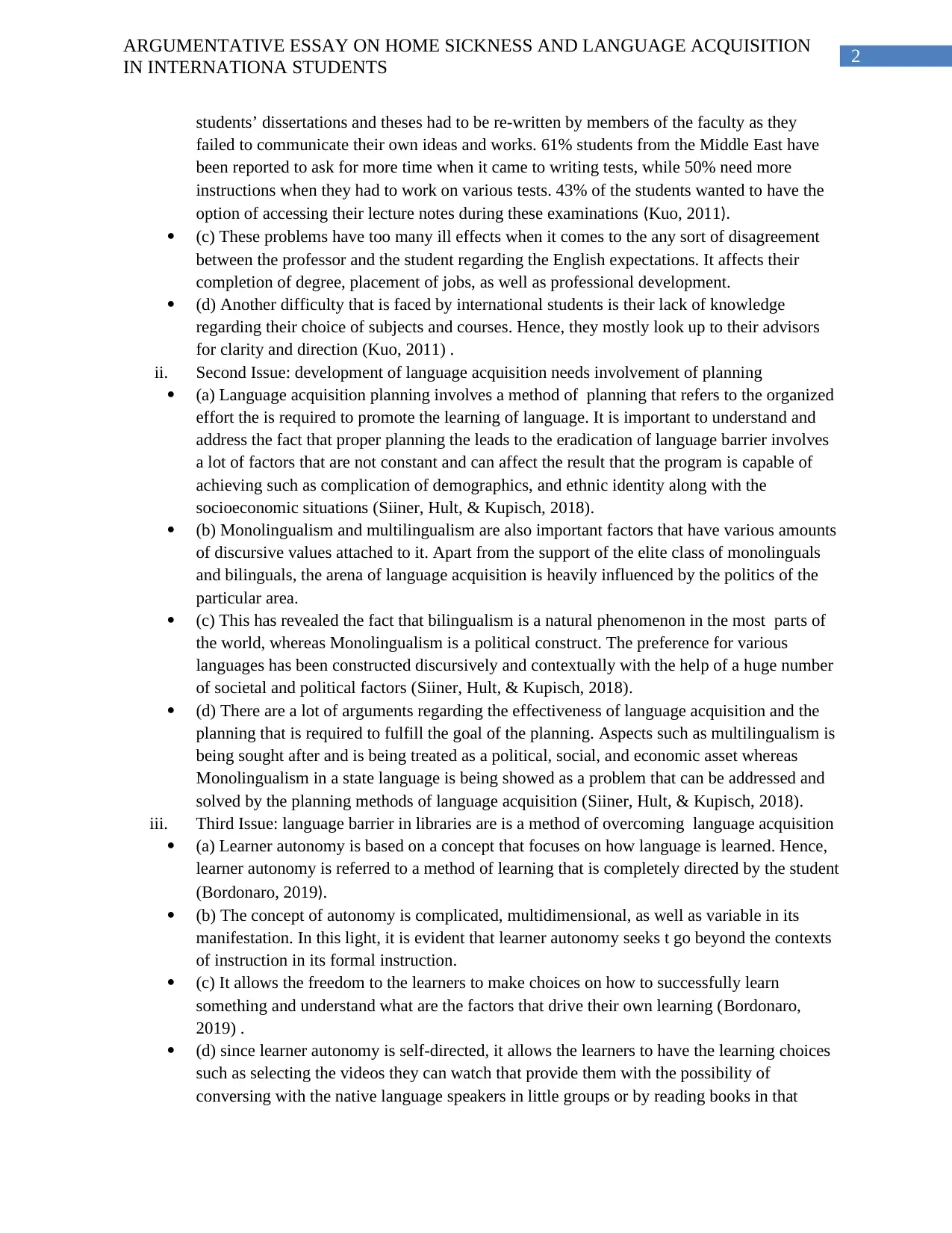
2
ARGUMENTATIVE ESSAY ON HOME SICKNESS AND LANGUAGE ACQUISITION
IN INTERNATIONA STUDENTS
students’ dissertations and theses had to be re-written by members of the faculty as they
failed to communicate their own ideas and works. 61% students from the Middle East have
been reported to ask for more time when it came to writing tests, while 50% need more
instructions when they had to work on various tests. 43% of the students wanted to have the
option of accessing their lecture notes during these examinations (Kuo, 2011).
(c) These problems have too many ill effects when it comes to the any sort of disagreement
between the professor and the student regarding the English expectations. It affects their
completion of degree, placement of jobs, as well as professional development.
(d) Another difficulty that is faced by international students is their lack of knowledge
regarding their choice of subjects and courses. Hence, they mostly look up to their advisors
for clarity and direction (Kuo, 2011) .
ii. Second Issue: development of language acquisition needs involvement of planning
(a) Language acquisition planning involves a method of planning that refers to the organized
effort the is required to promote the learning of language. It is important to understand and
address the fact that proper planning the leads to the eradication of language barrier involves
a lot of factors that are not constant and can affect the result that the program is capable of
achieving such as complication of demographics, and ethnic identity along with the
socioeconomic situations (Siiner, Hult, & Kupisch, 2018).
(b) Monolingualism and multilingualism are also important factors that have various amounts
of discursive values attached to it. Apart from the support of the elite class of monolinguals
and bilinguals, the arena of language acquisition is heavily influenced by the politics of the
particular area.
(c) This has revealed the fact that bilingualism is a natural phenomenon in the most parts of
the world, whereas Monolingualism is a political construct. The preference for various
languages has been constructed discursively and contextually with the help of a huge number
of societal and political factors (Siiner, Hult, & Kupisch, 2018).
(d) There are a lot of arguments regarding the effectiveness of language acquisition and the
planning that is required to fulfill the goal of the planning. Aspects such as multilingualism is
being sought after and is being treated as a political, social, and economic asset whereas
Monolingualism in a state language is being showed as a problem that can be addressed and
solved by the planning methods of language acquisition (Siiner, Hult, & Kupisch, 2018).
iii. Third Issue: language barrier in libraries are is a method of overcoming language acquisition
(a) Learner autonomy is based on a concept that focuses on how language is learned. Hence,
learner autonomy is referred to a method of learning that is completely directed by the student
(Bordonaro, 2019).
(b) The concept of autonomy is complicated, multidimensional, as well as variable in its
manifestation. In this light, it is evident that learner autonomy seeks t go beyond the contexts
of instruction in its formal instruction.
(c) It allows the freedom to the learners to make choices on how to successfully learn
something and understand what are the factors that drive their own learning (Bordonaro,
2019) .
(d) since learner autonomy is self-directed, it allows the learners to have the learning choices
such as selecting the videos they can watch that provide them with the possibility of
conversing with the native language speakers in little groups or by reading books in that
ARGUMENTATIVE ESSAY ON HOME SICKNESS AND LANGUAGE ACQUISITION
IN INTERNATIONA STUDENTS
students’ dissertations and theses had to be re-written by members of the faculty as they
failed to communicate their own ideas and works. 61% students from the Middle East have
been reported to ask for more time when it came to writing tests, while 50% need more
instructions when they had to work on various tests. 43% of the students wanted to have the
option of accessing their lecture notes during these examinations (Kuo, 2011).
(c) These problems have too many ill effects when it comes to the any sort of disagreement
between the professor and the student regarding the English expectations. It affects their
completion of degree, placement of jobs, as well as professional development.
(d) Another difficulty that is faced by international students is their lack of knowledge
regarding their choice of subjects and courses. Hence, they mostly look up to their advisors
for clarity and direction (Kuo, 2011) .
ii. Second Issue: development of language acquisition needs involvement of planning
(a) Language acquisition planning involves a method of planning that refers to the organized
effort the is required to promote the learning of language. It is important to understand and
address the fact that proper planning the leads to the eradication of language barrier involves
a lot of factors that are not constant and can affect the result that the program is capable of
achieving such as complication of demographics, and ethnic identity along with the
socioeconomic situations (Siiner, Hult, & Kupisch, 2018).
(b) Monolingualism and multilingualism are also important factors that have various amounts
of discursive values attached to it. Apart from the support of the elite class of monolinguals
and bilinguals, the arena of language acquisition is heavily influenced by the politics of the
particular area.
(c) This has revealed the fact that bilingualism is a natural phenomenon in the most parts of
the world, whereas Monolingualism is a political construct. The preference for various
languages has been constructed discursively and contextually with the help of a huge number
of societal and political factors (Siiner, Hult, & Kupisch, 2018).
(d) There are a lot of arguments regarding the effectiveness of language acquisition and the
planning that is required to fulfill the goal of the planning. Aspects such as multilingualism is
being sought after and is being treated as a political, social, and economic asset whereas
Monolingualism in a state language is being showed as a problem that can be addressed and
solved by the planning methods of language acquisition (Siiner, Hult, & Kupisch, 2018).
iii. Third Issue: language barrier in libraries are is a method of overcoming language acquisition
(a) Learner autonomy is based on a concept that focuses on how language is learned. Hence,
learner autonomy is referred to a method of learning that is completely directed by the student
(Bordonaro, 2019).
(b) The concept of autonomy is complicated, multidimensional, as well as variable in its
manifestation. In this light, it is evident that learner autonomy seeks t go beyond the contexts
of instruction in its formal instruction.
(c) It allows the freedom to the learners to make choices on how to successfully learn
something and understand what are the factors that drive their own learning (Bordonaro,
2019) .
(d) since learner autonomy is self-directed, it allows the learners to have the learning choices
such as selecting the videos they can watch that provide them with the possibility of
conversing with the native language speakers in little groups or by reading books in that
⊘ This is a preview!⊘
Do you want full access?
Subscribe today to unlock all pages.

Trusted by 1+ million students worldwide
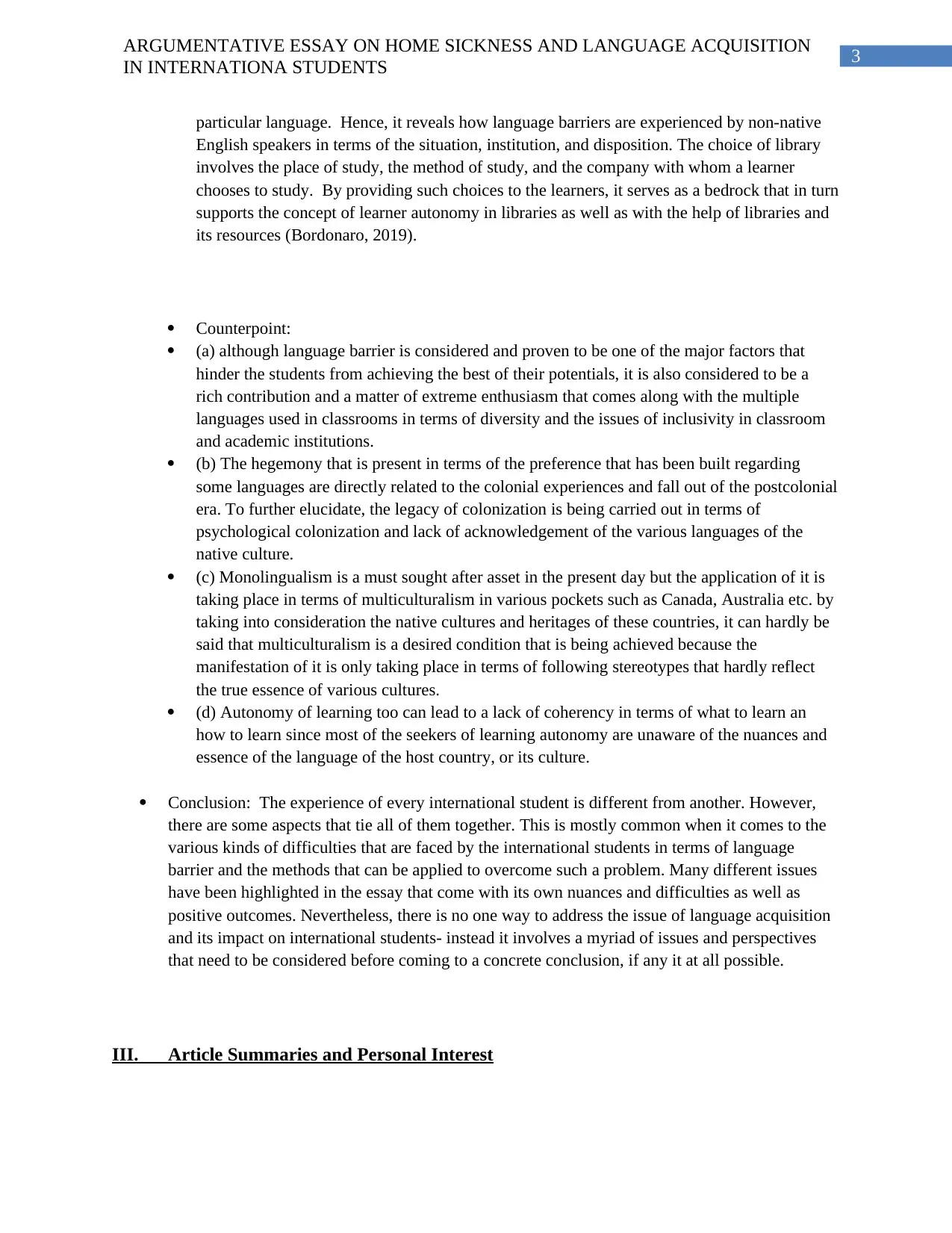
3
ARGUMENTATIVE ESSAY ON HOME SICKNESS AND LANGUAGE ACQUISITION
IN INTERNATIONA STUDENTS
particular language. Hence, it reveals how language barriers are experienced by non-native
English speakers in terms of the situation, institution, and disposition. The choice of library
involves the place of study, the method of study, and the company with whom a learner
chooses to study. By providing such choices to the learners, it serves as a bedrock that in turn
supports the concept of learner autonomy in libraries as well as with the help of libraries and
its resources (Bordonaro, 2019).
Counterpoint:
(a) although language barrier is considered and proven to be one of the major factors that
hinder the students from achieving the best of their potentials, it is also considered to be a
rich contribution and a matter of extreme enthusiasm that comes along with the multiple
languages used in classrooms in terms of diversity and the issues of inclusivity in classroom
and academic institutions.
(b) The hegemony that is present in terms of the preference that has been built regarding
some languages are directly related to the colonial experiences and fall out of the postcolonial
era. To further elucidate, the legacy of colonization is being carried out in terms of
psychological colonization and lack of acknowledgement of the various languages of the
native culture.
(c) Monolingualism is a must sought after asset in the present day but the application of it is
taking place in terms of multiculturalism in various pockets such as Canada, Australia etc. by
taking into consideration the native cultures and heritages of these countries, it can hardly be
said that multiculturalism is a desired condition that is being achieved because the
manifestation of it is only taking place in terms of following stereotypes that hardly reflect
the true essence of various cultures.
(d) Autonomy of learning too can lead to a lack of coherency in terms of what to learn an
how to learn since most of the seekers of learning autonomy are unaware of the nuances and
essence of the language of the host country, or its culture.
Conclusion: The experience of every international student is different from another. However,
there are some aspects that tie all of them together. This is mostly common when it comes to the
various kinds of difficulties that are faced by the international students in terms of language
barrier and the methods that can be applied to overcome such a problem. Many different issues
have been highlighted in the essay that come with its own nuances and difficulties as well as
positive outcomes. Nevertheless, there is no one way to address the issue of language acquisition
and its impact on international students- instead it involves a myriad of issues and perspectives
that need to be considered before coming to a concrete conclusion, if any it at all possible.
III. Article Summaries and Personal Interest
ARGUMENTATIVE ESSAY ON HOME SICKNESS AND LANGUAGE ACQUISITION
IN INTERNATIONA STUDENTS
particular language. Hence, it reveals how language barriers are experienced by non-native
English speakers in terms of the situation, institution, and disposition. The choice of library
involves the place of study, the method of study, and the company with whom a learner
chooses to study. By providing such choices to the learners, it serves as a bedrock that in turn
supports the concept of learner autonomy in libraries as well as with the help of libraries and
its resources (Bordonaro, 2019).
Counterpoint:
(a) although language barrier is considered and proven to be one of the major factors that
hinder the students from achieving the best of their potentials, it is also considered to be a
rich contribution and a matter of extreme enthusiasm that comes along with the multiple
languages used in classrooms in terms of diversity and the issues of inclusivity in classroom
and academic institutions.
(b) The hegemony that is present in terms of the preference that has been built regarding
some languages are directly related to the colonial experiences and fall out of the postcolonial
era. To further elucidate, the legacy of colonization is being carried out in terms of
psychological colonization and lack of acknowledgement of the various languages of the
native culture.
(c) Monolingualism is a must sought after asset in the present day but the application of it is
taking place in terms of multiculturalism in various pockets such as Canada, Australia etc. by
taking into consideration the native cultures and heritages of these countries, it can hardly be
said that multiculturalism is a desired condition that is being achieved because the
manifestation of it is only taking place in terms of following stereotypes that hardly reflect
the true essence of various cultures.
(d) Autonomy of learning too can lead to a lack of coherency in terms of what to learn an
how to learn since most of the seekers of learning autonomy are unaware of the nuances and
essence of the language of the host country, or its culture.
Conclusion: The experience of every international student is different from another. However,
there are some aspects that tie all of them together. This is mostly common when it comes to the
various kinds of difficulties that are faced by the international students in terms of language
barrier and the methods that can be applied to overcome such a problem. Many different issues
have been highlighted in the essay that come with its own nuances and difficulties as well as
positive outcomes. Nevertheless, there is no one way to address the issue of language acquisition
and its impact on international students- instead it involves a myriad of issues and perspectives
that need to be considered before coming to a concrete conclusion, if any it at all possible.
III. Article Summaries and Personal Interest
Paraphrase This Document
Need a fresh take? Get an instant paraphrase of this document with our AI Paraphraser
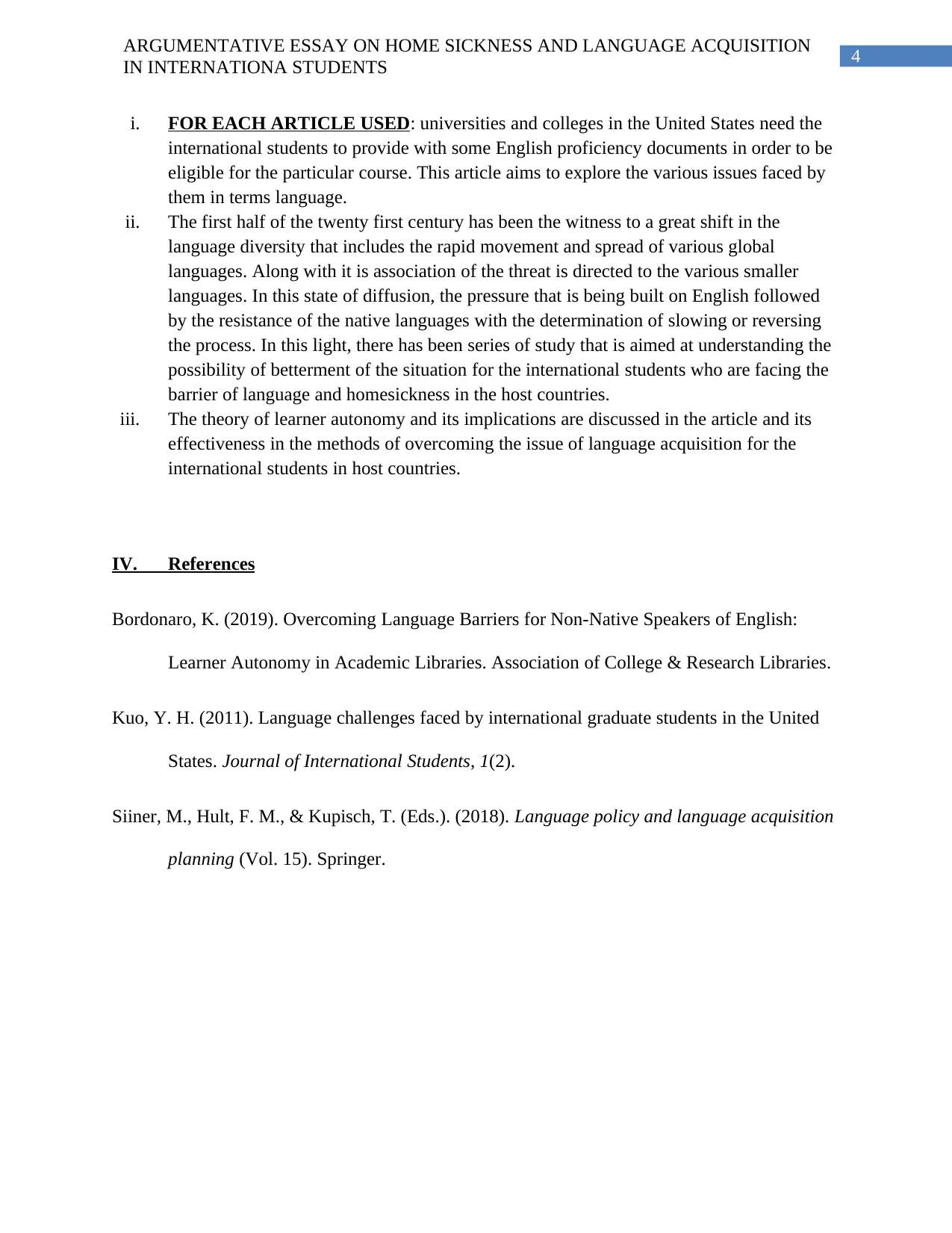
4
ARGUMENTATIVE ESSAY ON HOME SICKNESS AND LANGUAGE ACQUISITION
IN INTERNATIONA STUDENTS
i. FOR EACH ARTICLE USED: universities and colleges in the United States need the
international students to provide with some English proficiency documents in order to be
eligible for the particular course. This article aims to explore the various issues faced by
them in terms language.
ii. The first half of the twenty first century has been the witness to a great shift in the
language diversity that includes the rapid movement and spread of various global
languages. Along with it is association of the threat is directed to the various smaller
languages. In this state of diffusion, the pressure that is being built on English followed
by the resistance of the native languages with the determination of slowing or reversing
the process. In this light, there has been series of study that is aimed at understanding the
possibility of betterment of the situation for the international students who are facing the
barrier of language and homesickness in the host countries.
iii. The theory of learner autonomy and its implications are discussed in the article and its
effectiveness in the methods of overcoming the issue of language acquisition for the
international students in host countries.
IV. References
Bordonaro, K. (2019). Overcoming Language Barriers for Non-Native Speakers of English:
Learner Autonomy in Academic Libraries. Association of College & Research Libraries.
Kuo, Y. H. (2011). Language challenges faced by international graduate students in the United
States. Journal of International Students, 1(2).
Siiner, M., Hult, F. M., & Kupisch, T. (Eds.). (2018). Language policy and language acquisition
planning (Vol. 15). Springer.
ARGUMENTATIVE ESSAY ON HOME SICKNESS AND LANGUAGE ACQUISITION
IN INTERNATIONA STUDENTS
i. FOR EACH ARTICLE USED: universities and colleges in the United States need the
international students to provide with some English proficiency documents in order to be
eligible for the particular course. This article aims to explore the various issues faced by
them in terms language.
ii. The first half of the twenty first century has been the witness to a great shift in the
language diversity that includes the rapid movement and spread of various global
languages. Along with it is association of the threat is directed to the various smaller
languages. In this state of diffusion, the pressure that is being built on English followed
by the resistance of the native languages with the determination of slowing or reversing
the process. In this light, there has been series of study that is aimed at understanding the
possibility of betterment of the situation for the international students who are facing the
barrier of language and homesickness in the host countries.
iii. The theory of learner autonomy and its implications are discussed in the article and its
effectiveness in the methods of overcoming the issue of language acquisition for the
international students in host countries.
IV. References
Bordonaro, K. (2019). Overcoming Language Barriers for Non-Native Speakers of English:
Learner Autonomy in Academic Libraries. Association of College & Research Libraries.
Kuo, Y. H. (2011). Language challenges faced by international graduate students in the United
States. Journal of International Students, 1(2).
Siiner, M., Hult, F. M., & Kupisch, T. (Eds.). (2018). Language policy and language acquisition
planning (Vol. 15). Springer.
1 out of 5
Related Documents
Your All-in-One AI-Powered Toolkit for Academic Success.
+13062052269
info@desklib.com
Available 24*7 on WhatsApp / Email
![[object Object]](/_next/static/media/star-bottom.7253800d.svg)
Unlock your academic potential
Copyright © 2020–2026 A2Z Services. All Rights Reserved. Developed and managed by ZUCOL.




